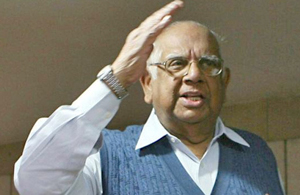New Delhi, Oct 25: The former Parliamentarian, who often fought against attempts by the judiciary to encroach upon the legislature's turf, says it was time the judiciary engaged in some introspection in the wake of the Supreme Court judgment which brought back the collegium system.
Chatterjee, who is a barrister and was a senior advocate in the Supreme Court for several years, told PTI the Executive should "not give up" its attempts to set things right in judicial appointments, "but should not have a running feud with the judiciary".
Noting that one of the judges on the apex court bench has voiced dissent to the majority judgment, he wanted the Executive to move slowly "in a proper manner and at a proper time".
"It is time for introspection for judiciary. Executive should not give up, but should not have a running feud with the judiciary. It should proceed ahead in a proper manner at a proper time. Already one judge has dissented," he said.
He said India is perhaps the only country where judges appoint judges and that they are "too touchy about this arrogation of power to themselves."
"This authority is neither there in the Constitution nor in law, but by judgements they have decided that judges will be appointed by judges. How many countries in the world follow this practice. It could have been followed by one or two banana republics. I don't know. Someone can teach me," he said.
Chatterjee said he was never in favour of collegium system and wondered if it was fool-proof. "Question is to get the best people appointed by those who have been authorised to do so," he said.
It needs to be seen whether collegium system brought extraordinary benefits to the judiciary or to judicial appointments.
"On the other hand, there are a lot of allegations. I am more concerned...Every Indian would have been beholden if they had tried to help people of India, if expeditious justice at not much cost was really meted out to them," he said.
Chatterjee said not many people today can afford to approach the Supreme court and hire an advocate to agitate their matter.
"What the Supreme Court is doing for ordinary citizens of India? Courts have arrogated all wisdom and power. Even after the entire Parliament unanimously approved the new law, it was struck down," he said.
He also wondered as to why the Supreme Court was hearing the matter on the issue of improving the collegium system when "judges know everything".






Comments
Add new comment